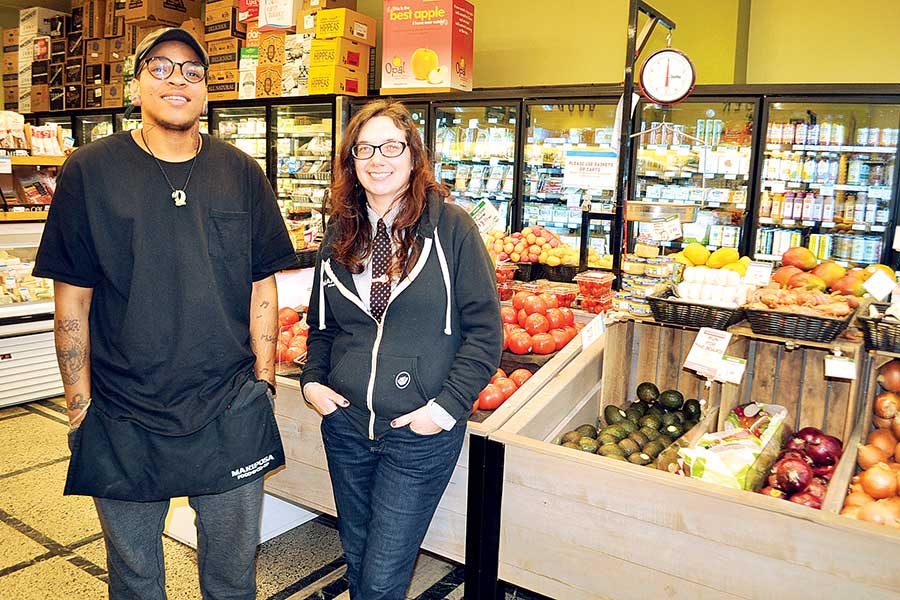Founded on antidiscrimination ideals, cooperatives have a storied history as LGBTQ havens.
“It’s pretty ingrained in the culture. [Co-ops] have been known as safe spaces for queer folks since probably the ’70s,” said Aj Hess, who’s worked in cooperatives since the early aughts.
Mariposa Food Co-op, the 48-year-old West Philadelphia staple, is no different.
Hess, the Co-op’s general manager, estimates Mariposa’s staff is about 30-percent queer, themselves included.
“When we talk about diversity, that’s an area where this co-op has done well for a long time. Having a large percentage of the staff outwardly identifying as queer makes the space more comfortable for people to shop here and attracts more staff who identify as queer,” Hess said.
Hayley Stormon, a West Philly transplant who identifies as genderqueer and bisexual, heard about the job and its benefits from a Mariposa alum.
“I think a large part of the draw was the queer-friendly aspect. It’s kind of daunting to look for a new job and wonder how you’re going to be perceived,” Stormon said.

The same reputation attracted Lique Dalton, a trans man born and raised in West Philly.
“Basically my last job wasn’t too good with trans people,” Dalton said. “So when I heard that this one was super trans-friendly, I was like, this would probably be a perfect fit.”
But while Mariposa has proved to be an internally inclusive employer, critics have posited the co-op hasn’t done enough to welcome West Philadelphia’s established black and brown communities.
In a Facebook post last month, the Black and Brown Workers Cooperative called for a “Time’s Up” for Mariposa, citing the organization as a cause of the rapid gentrification of West Philadelphia’s Baltimore Avenue, where the co-op operates a storefront.
“Over the years this institution has actively participated in the cultural displacement of West and Southwest Philly’s black and brown communities,” stated the Jan. 17 post. “Mariposa Food Co-op is inaccessible to the most vulnerable community members.”
Abdul-Aliy Abdullah Muhammad, cofounder of BBWC and a former Mariposa employee and board member, said Mariposa acts as a gentrifier by drawing predominantly white, non-working-class area transplants.
“The truth is that black people who are actually from that neighborhood see Mariposa as a white space so they don’t engage with Mariposa at all,” Abdullah Muhammad said. “Most of the black and brown people who go to Mariposa are middle-class black and brown folks. Largely those people are not from the neighborhood.”
Dalton, a grocery stocker at Mariposa, who grew up and still lives blocks from the co-op, expressed similar sentiments to the BBWC.
“[Mariposa] wasn’t presented for us like it was for white people. They’re just like, This is an organic food store, of course, it’s for me. But for black people, we don’t assume organic foodstuff is for us.”
For its part, Mariposa acknowledges how it’s perceived by West Philadelphia’s black and brown communities. It’s something Hess hopes to see addressed with the election of a new co-op board next month.
“I definitely want to see more awareness of the changing in the neighborhood and our impact on that,” Hess said. “Mariposa is a gentrifier in the neighborhood. Folks want to see us address that and kind of talk about it and do something differently.”
At present, Mariposa does have several low-price grocery programs intended to increase economic accessibility for West Philadelphia’s lower-income communities.
For folks looking to become member-owners, there are subsidies.
The Mariposa Owner Fund allows new member-owners to join for half of the $200 sign-up cost, with nothing due for the first year. After their anniversary, owners can pay the remaining $100 due in $10 monthly installments.
“So that’s a way to make it a little bit more accessible. We’re trying not to have any financial barrier for folks to become owners of the cooperative,” said Hess.
There’s also Food For All, which offers 10-percent discounts to anyone receiving government assistance for food access, i.e., SNAP, WIC and SSI, etc.
Mariposa began the program in September as a pilot with a 100-person cap. It reached capacity within a month and a half. Responding to community demand, the co-op has since extended its 2019 budget to allow for unlimited sign-ups and made literature on FFA available at check-out and through its newsletter which has 5,000-plus recipients.
Still, Dalton said Mariposa’s outreach efforts have room for improvement.
“A lot of people still don’t know that Mariposa exists. The only reason I knew about this store is because my aunt lived down the street from it. But a bunch of people I know who’re black in the community, they don’t know where Mariposa is. That’s a problem.”
Dalton said he hopes that a refreshed board will bring greater accessibility and philanthropic output from the co-op.
“I want the store to actually be completely accessible to everybody in the community, every last single person,” he said. “I want them to know that this is your store because this is your city.
“And because we’re here taking up space, let’s give back. Let’s say thank you for letting us be here. Like actual hands-on communication with the community. That’s what I would really appreciate.”
